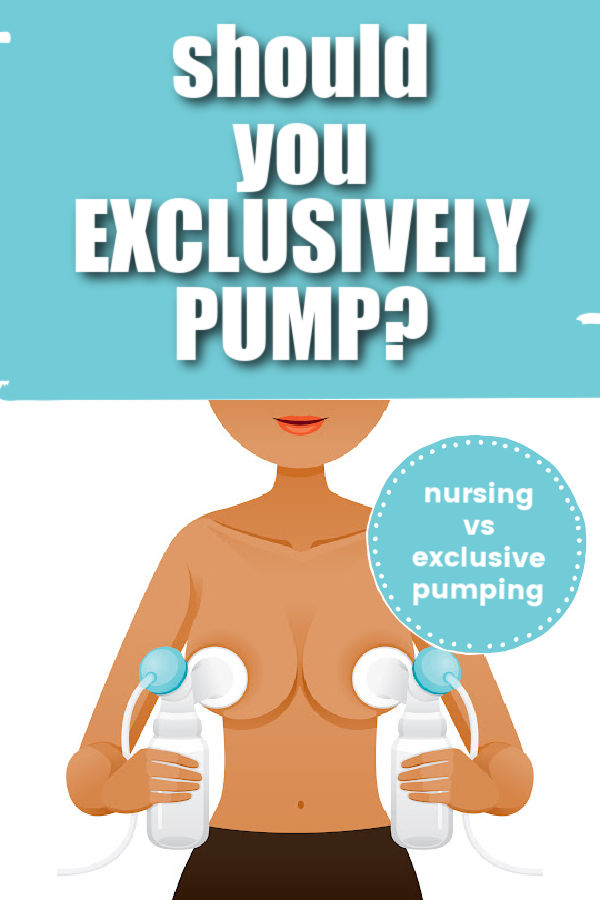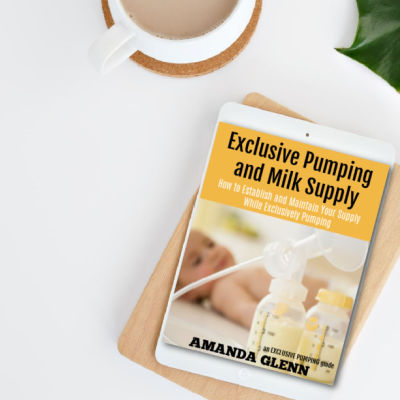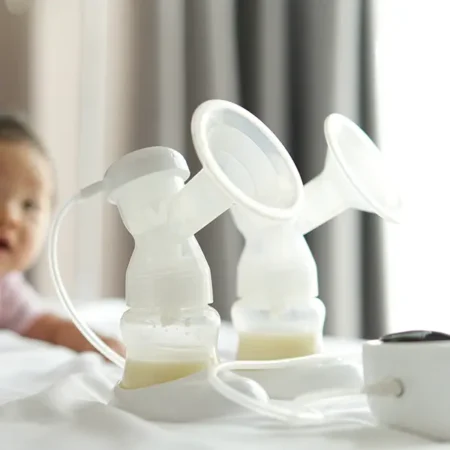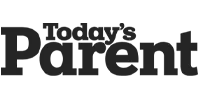Are you pregnant and thinking about how you want to feed your baby? Some people choose to nurse, others formula feed, and some exclusively pump. Here are the advantages of exclusively pumping vs breastfeeding (nursing).
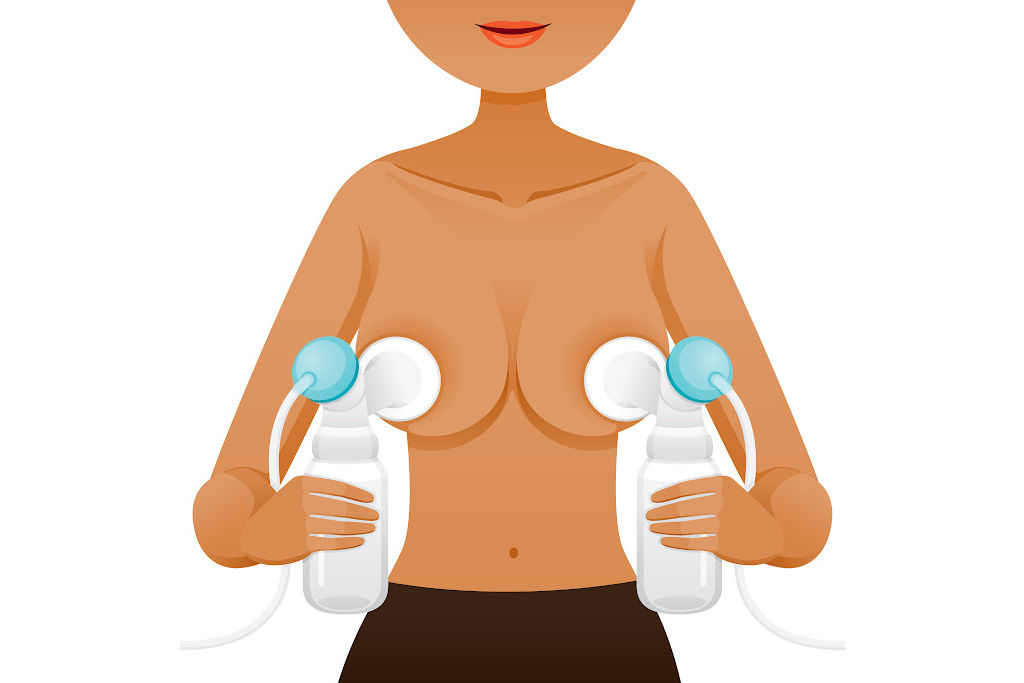
This post may contain affiliate links, which means if you click a link and purchase something, I may make a small commission at no additional cost to you. I only recommend products I love! More information here.
What is exclusive pumping?
There is no “official” definition of exclusive pumping, and often people mean different things when they use the term.
I define exclusively pumping as pumping breast milk for your baby, without also nursing the baby for feedings. It may also involve feeding supplemental formula or solid foods in addition to breast milk.
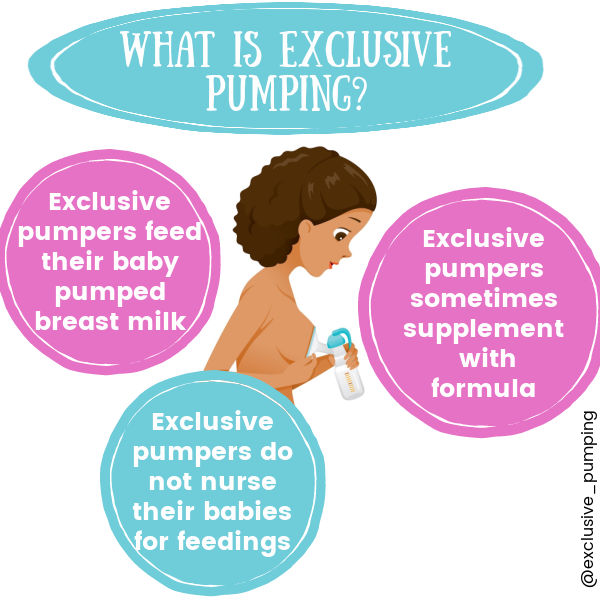
Sometimes exclusive pumping is referred to as “indirect” breastfeeding.
Most exclusive pumpers pump for a total of 120 minutes per day, with the number of pumping sessions depending on the age of the baby. (Here are some sample pumping schedules over the first year.)
Is exclusive pumping breastfeeding?
Yes, it is.
When you pump milk from your breasts and feed it to your baby, you are breastfeeding. There’s an extra step, and it’s not direct, but your baby is being fed from your body.
Many people use the terms “nursing” and “breastfeeding” interchangeably, but they aren’t the same thing.
Nursing is feeding a baby directly from your breasts.
Breastfeeding can refer to feeding a baby either directly and indirectly from your breasts.
What are the advantages to exclusively pumping?
While exclusive pumping isn’t always one’s first choice, there are some pros to doing it. Here are some of them.
1. You always know how much baby is eating.
Because breasts don’t have ounce markers on them, when you’re nursing the only way to tell for sure how much milk your baby is getting is by weighing her before and after a feeding using a baby scale.
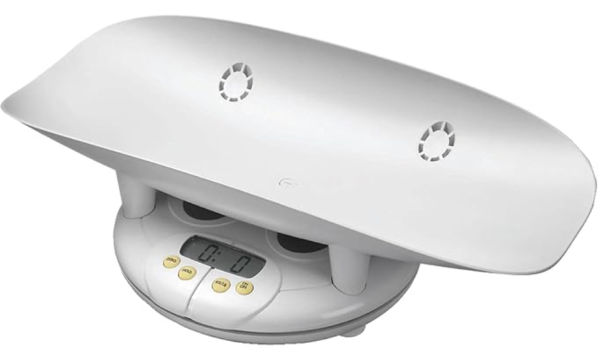
When you’re exclusively pumping and your baby is drinking from a bottle, you can always see how much milk your baby is getting. This can be helpful if you have concerns about your baby getting enough milk and gaining enough weight.
2. It’s easier to monitor your milk supply.
When you’re nursing, how much milk you’re making can also be a bit of a mystery. You might have a clue that your supply is decreasing if your breasts seem less full or your baby seems hungrier than usual – but even then, you don’t really know whether it’s her (having a growth spurt) or you (losing supply).
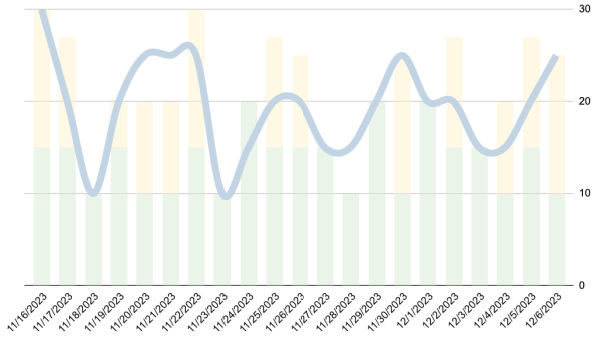
It’s much easier for exclusive pumpers to see increases or decreases to milk supply, and potentially make adjustments like pumping more often or trying other methods to boost supply.
3. Breast pumps don’t have teeth.
Having your nipple bitten by a teething baby can be painful.
Fortunately, breast pumps don’t bite!
4. Weaning can sometimes be easier.
I have nursed two kids and exclusively pumped for one. The two kids that I nursed LOVED nursing and had zero interest in stopping when I was ready to be done at 18 months.
In both cases, I ended up going ahead and weaning before they were really ready, and I felt very guilty about it.
Breast pumps usually don’t have the same sort of attachment to the breastfeeding relationship, so once you introduce a new milk to your baby or toddler (whether it’s formula, cow’s milk, or an alternative like almond or goat’s milk), you can get started and wean at your own pace.
Need help with exclusive pumping? Use EPUMP30 for 30% off
5. Everyone knows that you’re a pumping rock star!
Pumping isn’t a lot of people’s favorite thing to do.
So when other people hear that you’re spending two hours of your day attached to a breast pump, it’s clear that you are killing it at pumping, you love your baby, and you’re an awesome mom. Because you are!
What are the advantages to nursing?
However, there are also quite a few pros to nursing instead of exclusively pumping.
1. It’s less time consuming.
Exclusive pumping can take twice as much time as nursing, because there are two steps – removing the milk from your breasts, and then feeding it to your baby. Nursing just has one step.
Note: This isn’t always the case for newborns, who may nurse very slowly as they are learning how to latch and remove milk, but older babies tend to be much more efficient.
2. You have less washing and cleaning.
Pumping around the clock means washing a lot of pump parts and bottles (and finding space for it all to dry and be stored).

With nursing, you just have to wash your hands.
3. It’s easier to get out of the house.
When you leave your home with your baby during a feeding as a nursing parent, you just have to bring your baby (and a nursing cover, if you want to use one).
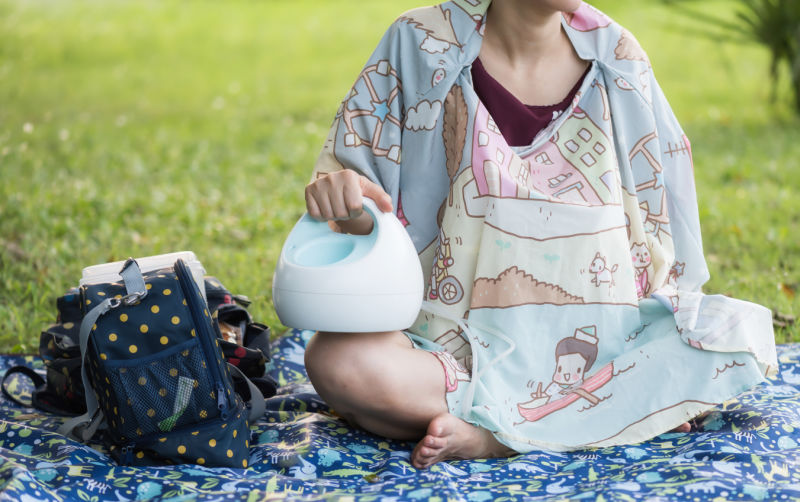
When you’re exclusively pumping, you have to pack and bring a pump bag with a pump, pump parts, bottles, a cooler, a nursing cover, etc.
4. Less judgement from other people.
Most people understand what nursing is and why it’s beneficial for both parent and baby.
On the other hand, a lot of people have no idea what exclusive pumping is, and it can be a hassle to deal with comments. It’s also not uncommon for doctors to be unfamiliar with it – my own pediatrician told me I wouldn’t be able to keep it up.
Bottom Line: Pumping vs Breastfeeding (Nursing)
If you’re on the fence about whether to pump or nurse, I would suggest trying nursing and see how it goes. Having done both, exclusive pumping is definitely doable, it’s a valid way to feed your baby, and there are many reasons to prefer it – but nursing can be easier over the long-term.
If you decide to exclusively pump from birth, though, here’s more information about how to do that and here are some tips for making exclusive pumping work.
Hopefully this help you get an idea of the advantages of pumping vs nursing! Please feel free to add your thoughts in the comments.
